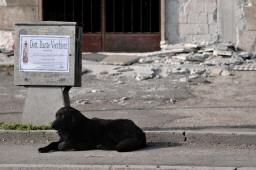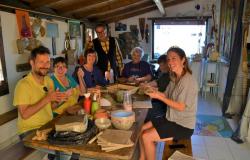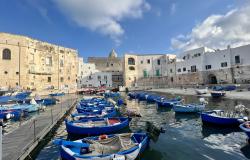Rescue workers and charities are not just helping human victims of last week's earthquake in L'Aquila but are also doing their best for the thousands of animals left lost, homeless or injured after the devastation.
Rescue workers have pulled at least 50 pets from the rubble in recent days, while volunteers from several animal groups have set up donation collection points, treatment centres and temporary shelters to help those in need.
Two days after the quake, the Italian Association for the Protection of Animals (AIDAA) estimated that around 5,000 animals were still wandering the streets of affected areas, either abandoned by panicked owners or lost during the chaos.
Since then, volunteers have been working round the clock to capture the animals, provide them with medical treatment where necessary, shelter them and track down their owners.
AIDAA and Italy's largest animal welfare group, the National Animal Protection Authority (ENPA), have both set up call centres for people to report stray and injured animals.
Vets from across the country, coordinated by ENPA, have been donating their time over the Easter weekend to assist those in need, while Rome's Animal Protection Department has set up a long-term veterinary centre in a tent city in the nearby village of San Vittorino.
ENPA said on Tuesday that thanks to an overwhelming response from the Italian public, it had already distributed 27 tonnes of donated animal food, 160 pet carriers, as well as collars, leads and food bowls.
''The ENPA centre still has plenty of food and materials waiting to be distributed,'' a statement from ENPA explained.
''These will be sent to a central government animal shelter in L'Aquila and then forwarded to those in need''.
But organizations have warned that the immediate post-quake rescue is just the first step in a long-term process.
The two biggest problems facing animal workers is tracking down owners and providing more permanent housing for pets.
ENPA has set up an email address for people to send in photographs and descriptions of missing animals, while both ENPA and AIDAA are accepting reports of missing animals over the phone.
The Italian Animal Rights League (LIDA) explained that it was even proving difficult to reunite animals whose owners had been identified.
''It has repeatedly been the case that we have rescued animals but even though they were microchipped or had collar tags, it has been almost impossible to track down or contact their owners, as they are scattered throughout the different tent cities and we have no way of getting in touch with them,'' LIDA said.
Another problem has been housing animals.
A number of temporary shelters have been set up at different camps but space is short, explained Walter Caporale, president of the Animalisti Italiani association.
The situation has been aggravated by the fact that even when pets and owners escaped together, many temporary accommodation structures are refusing to accept animals.
''The local health authorities and our volunteers have therefore started working to try organize special animals areas within tent cities and hotels, setting up spaces where animals can be housed near their owners, without disturbing other residents,'' said Caporale.
''This will allow us to ensure animals in real need receive treatment, while families can remain close to their four-legged friends, avoiding further suffering for both pet and owner''.
But although conditions remain difficult for most animals in the quake area, the generosity of the public and the hard work of volunteers has ensured many more have survived and will eventually be reunited with their owners than would otherwise have been the case.
One such story emerged on Easter Sunday, when a tiny grey dog was pulled alive and well from the remains of a hotel after spending eight days trapped beneath rubble.
Nicknamed ''Pasqualina'', meaning Little Easter, by rescue workers, the dog was staying in a L'Aquila hotel with her owners from Rome when the quake struck.
The couple only realized their beloved pet was trapped inside after fleeing the hotel.
''At that point it was too late - the stairs had collapsed and when I tried to get back in, the floor gave way as well,'' explained Marcello Luciolimoli, who had to be held back by firefighters as he struggled to get in.
The couple eventually gave up and returned to Rome. But on Easter Sunday, they rushed back to L'Aquila for an emotional reunion with Pasqualina, after rescue workers tracked them down through her microchip.





